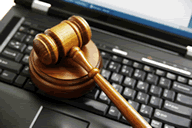 The rise of the software industry following the personal computer revolution in the early 1980s created a heated policy debate about whether this “computer-implemented technology” should be secured in the patent system. The debate culminated this year with the Supreme Court’s cert grant in Alice Corp. v. CLS Bank, in which the Court will determine whether computer-implemented technology, such as computer software programs like Excel or Word, are eligible for patent protection or whether they should be excluded from the patent system on the grounds that they are “abstract ideas” tantamount to scientific formulas or mathematical algorithms. Given the “smart phone war” between Apple, Samsung, Google, Microsoft, and other high-tech firms, many commentators in newspaper articles, in blogs, and at conferences now complain about the “problem of software patents.” But for at least twenty years, patents have secured software and served an important function in bringing to market technological innovation once imagined as only science fiction — tablet computers, smart phones, wireless telecommunication, cloud computing, and streaming television, movies and songs, to name but a few. In Alice, the Court holds the fate of a significant portion of America’s innovation economy in its hands, as the Justices will wrestle with the difficult issues of how the patent system can best promote high-tech innovation in the twenty-first century.
The rise of the software industry following the personal computer revolution in the early 1980s created a heated policy debate about whether this “computer-implemented technology” should be secured in the patent system. The debate culminated this year with the Supreme Court’s cert grant in Alice Corp. v. CLS Bank, in which the Court will determine whether computer-implemented technology, such as computer software programs like Excel or Word, are eligible for patent protection or whether they should be excluded from the patent system on the grounds that they are “abstract ideas” tantamount to scientific formulas or mathematical algorithms. Given the “smart phone war” between Apple, Samsung, Google, Microsoft, and other high-tech firms, many commentators in newspaper articles, in blogs, and at conferences now complain about the “problem of software patents.” But for at least twenty years, patents have secured software and served an important function in bringing to market technological innovation once imagined as only science fiction — tablet computers, smart phones, wireless telecommunication, cloud computing, and streaming television, movies and songs, to name but a few. In Alice, the Court holds the fate of a significant portion of America’s innovation economy in its hands, as the Justices will wrestle with the difficult issues of how the patent system can best promote high-tech innovation in the twenty-first century.
Featuring:
- Prof. Adam Mossoff, Professor of Law and Co-Director of Academic Programs and Senior Scholar of the Center for the Protection of Intellectual Property, George Mason University School of Law
[Return to the Practice Groups Podcasts menu]






